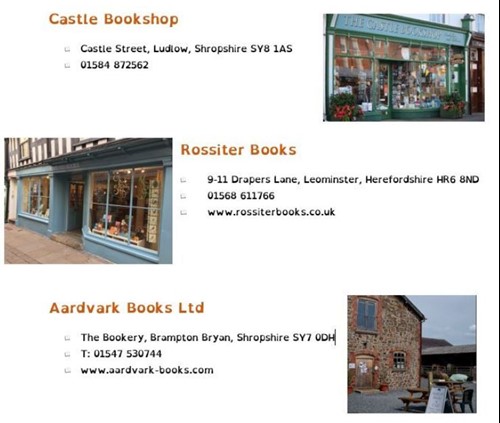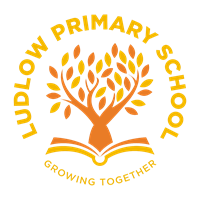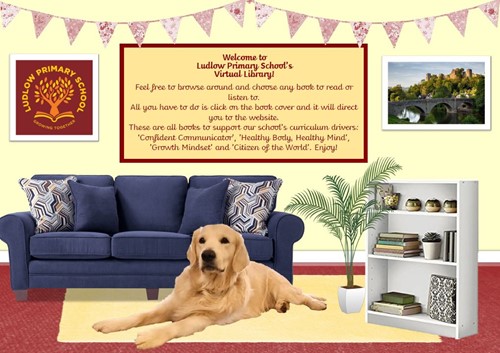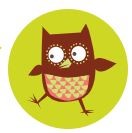Encouraging Reading
At Ludlow Primary School, our aim is to encourage a love of reading, which will remain with a child for life. Children are offered a wide range of reading material, including fiction, non-fiction and poetry. They are encouraged to share books with adults working in the school as well as taking them home to share with family and friends.
Reading, and developing a passion for reading, is one of the most useful things that a child can learn when they are young. Research suggests that the more a child reads for pleasure, the more likely they are to be successful when they are older.
At school, children read a wide range of texts, developing a range of reading skills throughout the curriculum including whole class sessions, one to one reading and reading independently.
Phonics
At Ludlow Primary School, we use 'Read, Write Inc' to teach phonics. We have daily 30-minute phonic sessions during EYFS and KS1, where we learn about how to read using our phonic knowledge. We play lots of different phonic games which help us understand how sounds make words and we use words to make sentences.
Whole Class Reading
From Year 2, we conduct reading sessions as a whole class. During these sessions, we ensure children are immersed in high-quality literature and learn the skills needed in order to develop a greater understanding of the texts. We often use E.R.I.C (Explain, Retrieve, Infer, Choice) in our whole-class sessions and practise the skills needed to confidently discuss the books/text we are reading.
Parental Support
At Ludlow Primary School, we understand the importance of reading and value the support parents give us with regards to their child learning to read, and developing an enjoyment of it.
 Ludlow Primary School's Virtual Library
Ludlow Primary School's Virtual Library
Have you seen our Virtual Library? Click on the image to have a look! All of the books on the shelves have all been chosen to support our school’s curriculum drivers: 'Confident Communicator', 'Healthy Body, Healthy Mind', 'Growth Mindset' and 'Citizens of the World'. Click on each of the books to read an extract from the book or to hear a video of the book being read.
Documents you may find helpful to support your child with their reading
 Reading at LPS - Parent Information
Reading at LPS - Parent Information  10 tips for hearing your child read
10 tips for hearing your child read
 Helping your child read at home - KS1
Helping your child read at home - KS1  Helping your child read at home - KS2
Helping your child read at home - KS2
 Question prompts when reading with your child
Question prompts when reading with your child  Reading book recommendations for year groups
Reading book recommendations for year groups
Website Links
Click the link below for more help and support for parents, as well as access to hundreds of free books to read online with your child!
https://www.pearson.com/uk/learners.html
Local bookshops you might like to visit

10 Benefits of Reading
Children who read often and widely get better at it.
After all, practise makes perfect in almost everything humans do, and reading in no different.
Reading exercises our brain.
Reading is a much more complex task for the human brain rather than watching TV, for example. Reading strengthens brains connections and builds NEW connections.
Reading improves concentration.
Children have to sit still and quietly so that they can focus on the story when they are reading. If the read often, they will develop the skill to do this for longer.
Reading teaches children about the world around them.
Through reading a variety of books children learn about people, places, and events outside of their own experience.
Reading improves vocabulary and language skills.
Children learn new words as they read. Subconsciously, they absorb information on how to structure sentences and how to use words and other language features effectively in their writing and speaking.
Reading develops a child's imagination.
As we read our brains translate the descriptions we read of people, places and things into pictures. While we are engaged in a story we are also imagining how a character is feeling. Young children then bring this knowledge into their everyday play.
Reading helps children to develop empathy.
As children develop they begin to imagine how they would feel in that situation.
Reading is fun.
A book or an e-reader doesn't take up much space and is light to carry, so you take it anywhere so you can never be bored if you have a book in your bag.
Reading is a great way to spend time together.
Reading together on the sofa, bedtimes stories and visiting the library are just some ways of spending time together.
Children who read achieve better in school.
Reading promotes achievement in all subjects, not just English. Children who are good readers tend to achieve better across the curriculum.
 Ludlow Primary School (for ages 2-11)
Ludlow Primary School (for ages 2-11)



